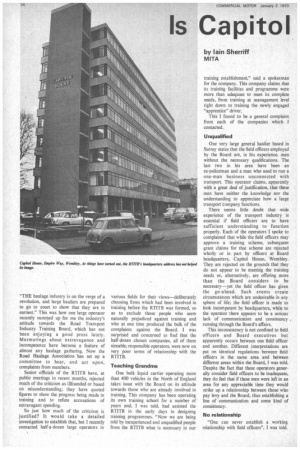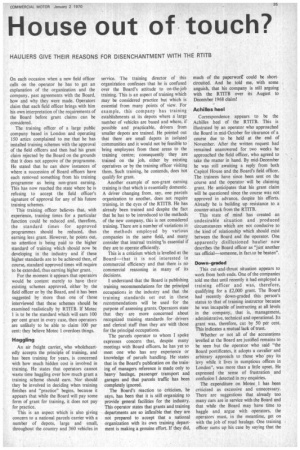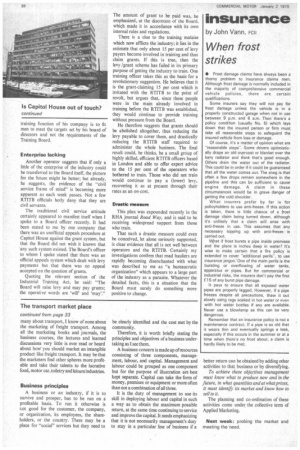Capitol
Page 36

Page 37

Page 38

If you've noticed an error in this article please click here to report it so we can fix it.
House out of touch?
by lain Sherriff MITA
"THE haulage industry is on the verge of a revolution, and large hauliers are prepared to go to court to show that they are in earnest." This was how one large operator recently summed up for me the industry's attitude towards the Road Transport Industry Training Board, which has not been enjoying a good press lately. Murmurings about extravagance and incompetence have become a feature of almost any haulage gathering. Now the Road Haulage Association has set up a committee to hear, and act upon, complaints from members.
Senior officials of the RTITB have, at public meetings in recent months, rejected much of the criticism as Wounded or based on misunderstanding; they have quoted figures to show the progress being made in training and to refute accusations of extravagant spending.
So just how much of the criticism is justified? It would take a detailed investigation to establish that, but I recently contacted half-a-dozen large operators in various fields for their views—deliberately choosing firms which had been involved in training before the RTITB was formed, so as to exclude those people who seem naturally prejudiced against training and who at one time produced the bulk of the complaints against the Board. I was surprised and concerned to find that the half-dozen chosen companies, all of them sizeable; responsible operators, were now on very poor terms of relationship with the RTITB.
Teaching Grandma
One bulk liquid carrier operating more than 400 vehicles in the North of England takes issue with the Board on its attitude towards those who are already involved in training. This company has been operating its own training school for a number of years and, I was told, had assisted the RTITB in the early days in designing training programmes. "Now we are being told by inexperienced and unqualified people from the RTITB what is necessary in our training establishment," said a spokesman for the company. This company claims that its training facilities and programme were more than adequate to meet its complete needs, from training at management level right down to training the newly engaged "apprentice" driver.
This I found to be a general complaint from each of the companies which I contacted.
Unqualified
One very large general haulier based in Surrey states that the field officers employed by the Board are, in his experience, men without the necessary qualifications. The last two in his area have been an ex-policeman and a man who used to run a one-man business unconnected with transport. This operator claims, apparently with a great deal of justification, that these men have neither the knowledge nor the understanding to appreciate how a large transport company functions.
There seems little doubt that wide experience of, the transport industry is essential if field officers are to have sufficient understanding to function properly. Each of the operators I spoke to complained that while the field officers may approve a training scheme, subsequent grant claims for that scheme are rejected wholly or in part by officers at Board headquarters, Capitol House, Wembley. They are rejected on the grounds that they do not appear to be meeting the training needs or, alternatively, are offering more than the Board considers to be necessary--yet the field officer has given the go-ahead. Such events create circumstances which are undesirable in any. sphere of life; the field officer is made to look incompetent by headquarters, while to the operator there appears to be a serious lack of communication and consistency running through the Board's affairs.
This inconsistency is not confined to field officers •and Board executives but apparently occurs between one field officer and another. Different interpretations are put on identical regulations between field officers in the same area and between different areas within the Board, I was told. Despite the fact that these operators generally consider field officers to be inadequate, they do feel that if these men were left in an area for any appreciable time they would strike up a relationship between those who pay levy and the Board, thus establishing a line of communication and some kind of consistency.
No relationship
"One can never establish a working relationship with field officers", I was told. On each occasion when a new field officer calls on the operator he has to get an explanation of the organization and the company, past agreements with the Board, how and why they were made. Operators claim that each field officer brings with him his own interpretation of the requirements of the Board before grant claims can be considered.
The training officer of a large public company based in London and operating 150 artics complained to me that he has installed training schemes with the approval of the field officers and then had his grant claim rejected by the Board on the grounds that it does not approve of the programme. He stated that he can show instances of where a succession of Board officers have each removed something from his training programme as being non-grant earning. This has now reached the state where he is refusing to accept the field officer's signature of approval for any of his future training schemes.
This training officer believes that, with experience, training times for a particular function could be reduced and, therefore, the standard times for approved programmes should be reduced, thus earning less grant. However, he points out, no attention is being paid to the higher standard of training which should now be developing in the industry and if these higher standards are to be achieved then, of course, standard approved times will require to be extended, thus earning higher grant.
For the moment it appears that operators would be content merely to have their existing schemes approved, either by the field officer or by the Board, and it has been suggested by more than one of those interviewed that these schemes should be examined realistically by RTITB. If Motec 1 is to be the standard which will earn 100 per cent grant in every case, then operators are unlikely to be able to claim 100 per cent: they believe Motec 1 overdoes things.
Haggling An air freight carrier,, who wholeheartedly accepts the principle of training, and has been training for years, is concerned with how much hidden cost is involved in training. He states that operators cannot waste time haggling over how much grant a training scheme should earn. Nor should they be involved in deciding when training finishes and "practice" begins, because it appears that while the Board will pay some form of grant for training, it does not pay for practice.
This is an aspect which is also giving concern to a national parcels carrier with a number of depots, large and small, throughout the country and 360 vehicles in service. The training director of this organization confesses that he is confused over the Board's attitude to on-the-job training. This is an aspect of training which may' be considered practice but which is essential from many points of view. For example, this company has training establishments at its depots where a large number of vehicles are based and where, if possible and practicable, drivers from smaller depots are trained. He pointed out that there are small depots in isolated communities and it would not be feasible to bring employees from these areas to the training centre; consequently they are trained on the job, either by existing operatives or by the training officer visiting them. Such training, he contends, does hot qualify for grant.
Another example of non-grant earning training is that which is essentially domestic. A driver changing from, say, one parcels organization to another, does not require training, in the eyes of the RTITB. He has already been trained and despite the fact that he has to be introduced to the methods of the new company, this is not considered training. There are a number of variations in the methods employed by various companies in the same field, and many consider that internal training 'is essential if they are to operate efficiently.
This is a criticism which is levelled at the Board—that it is not interested in commercial efficiency and that there is no commercial reasoning in many of its decisions.
I understand that the Board is publishing training recommendations for the principal occupations in the industry and that the training standards set out in these recommendations will be used for the purpose of assessing grants. Operators state that they are more concerned about recognized training standards for drivers and clerical staff than they are with those for the principal occupations.
The parcels operator to whom I spoke expresses concern that, despite many meetings with Board officers, he has yet to meet one who has any experience or knowledge of parcels handling. He states that in the Board's publication on the training of managers reference is made only to heavy haulage, passenger transport and garages and that parcels traffic has been completely ignored.
The Board's reaction to criticism, he says, has been that it is still organizing to provide general facilities for the industry. This operator states that grants and training departments are so inflexible that they are not prepared to accept that a national organization with its own training department is making a genuine effort. If they did, much of the paperwoil could be shortcircuited. And he told me, with some anguish, that his company is still arguing with the RTITB over its August to December 1968 claim!
Achilles heel
Correspondence appears to be the Achilles heel of the RTITB. This is illustrated by an operator who approached the Board in mid-October for clearance of a course due to be held at the end of November. After the written request had remained unanswered for two weeks he approached the field officer, who agreed to take the Matter in hand. By mid-December he was still awaiting a reply from both Capitol House and the Board's field officer. The trainees have since been sent on the course and the operator will be claiming grant. He anticipates that his grant claim will be questioned since the course was not approved in advance, despite his efforts. Already he is building up resistance to a counter-attack from the RTIT13.
This state of mind has created an undesirable situation and produced circumstances which are not conducive to the kind of relationship which should exist between the Board and the operator. One apparently disillusioned haulier now describes the Board officer as "just another tax official—someone, in fact,to be beaten".
Down-graded This cut-and-thrust situation appears to work from both ends. One of the companies told me that until recently it had employed a training officer and was, therefore, qualifying for a £2,000 grant. The Board had recently down-graded this person's status to that of training instructor because he was incapable of instructing at all levels in the company, that is, management, administrative, technical and operational. Its grant was, therefore, cut by 50 per cent. This indicates a mutual lack of trust.
Whether or not all of the accusations levelled at the Board are justified remains to be seen but the operator who said "the Board pontificates, it adopts a cavalier and arbitrary approach to those who' pay its levy while it lives in sumptious offices in London", was more than a little upset. He expressed the sense of frustration and confusion I detected in my enquiries.
The expenditure on Motec 1 has been criticized as excessive and unnecessary. There are suggestions that already too many cars are in service with the Board and that while the Board may have time to haggle and argue with operators, the operators must, in the meantime, get on with the job of road haulage. One training . officer sums up his case by saying that the training function of his compapy is to fit men to meet the targets set by his board of directors and not the requirements of the Training Board.
Enterprise lacking Another operator suggests that if only a little of the enterprise of the industry could be transferred to the Board itself, the picture for the future might be better; but already, he suggests, the evidence of the "civil service frame of mind" is becoming more apparent as each week passes. Not a few RTITB officials hotly deny that they are civil servants.
The traditional civil service attitude certainly appeared to manifest itself when I spoke to a Board officer recently. It had been stated to me by one company that there was an unofficial appeals procedure at Capitol House against the grant system, but that the Board did not wish it known that any such system existed. The Board's officer to whom I spoke stated that there was an official appeals system which dealt with levy payments but that there was no appeal accepted on the question of grants.
Quoting the relevant section of the Industrial Training Act, he said: "The Board will raise levy and may pay grants; the operative words are 'will' and `may'." The amount of grant to be paid was, he emphasized, at the discretion of the Board, which made it in accordance with its own internal rules and regulations.
There is a clue to the training malaise which now afflicts the industry; it lies in the estimate that only about 15 per cent of levy payers become involved in training and thus claim grants. If this is true, then the levy /grant scheme has failed in its primary purpose of getting the industry to train. One training officer takes this as the basis for a revolutionary suggestion. He believes that it is the grant-claiming 15 per cent which is irritated with the RTITB to the point of revolt, but argues that, since these people were in the main already involved in training before the RTITB was established, they would continue to provide training without pressure from the Board.
He therefore suggests that grants should be abolished altogether, thus reducing the levy payable to cover them, and drastically reducing the RTITB staff required to administer the whole business. The final result could, he thinks, be a small group of highly skilled, efficient RTITB officers based in London and able to offer expert advice to the 15 per cent of the operators who bothered to train. Those who did not train would continue to pay a (lower) levy, recovering it as at present through their rates as an on-cost.
Drastic measure
This plan was expounded recently in the RHA journal. Road Way, and is said to be receiving widespread support from those who train.
That such a drastic measure could even be conceived, let alone seriously supported, is clear evidence that all is not well between operators and the RTITB. Certainly my investigations confirm that road hauliers are rapidly becoming disenchanted with what was described to me as "a bureaucratic organization" which appears to a large part of the industry as a parasite. Whatever the detailed facts, this is a situation that the Board must surely do something more positive to change.




















































































